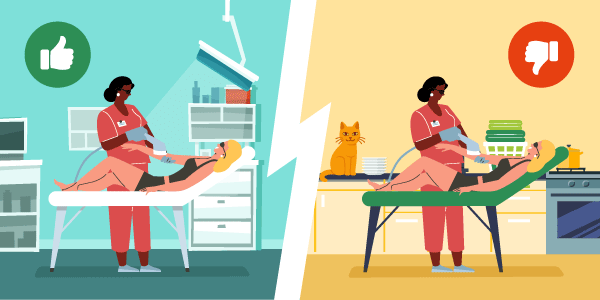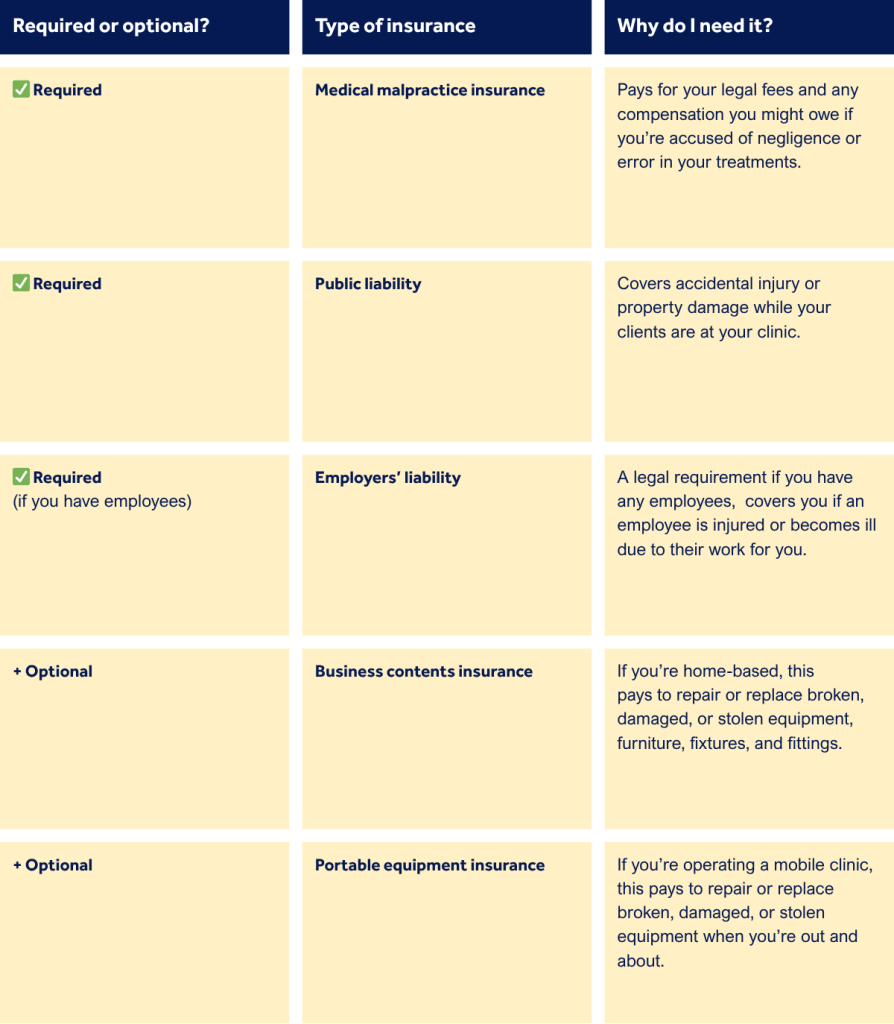
Chances are, you’ve landed here because you’re thinking of starting an aesthetics business and you’ve settled on basing it out of either your home or a mobile clinic.
They’re both great options. Not only does it give you more flexibility in how and when you operate, but you also have more control over the experience you offer your clients.
It’s also a good way of controlling your budget. There’s no rent to pay or security deposits to worry about. And you have complete control over your utilities.
It’s not all sunshine and rainbows, though. There are some very real cons you’ll have to deal with if you decide to go down this route for your business.
You have legal and regulatory requirements to meet. As well as making sure you follow your insurer’s criteria for cover.
On top of that, there’s the changing landscape of aesthetics legislation to worry about. The future of running an aesthetics business from home or a mobile clinic is uncertain. You need to be prepared for that.
Starting from the top
But first, if you haven’t read our previous guide on starting an aesthetics business, we’d recommend checking that out. It’ll give you all the essential information you need before launching into the next stage of your business.
If you’re tight on time, we’ll summarise a few key points you need to bear in mind before we get into the nitty gritty of what you need to do to run an aesthetics business from home:
- Join a governing body – they’ll guide you on what training and qualifications you’ll need. As well as keep you up to date on the latest regulatory changes within the industry. They also provide comprehensive guidance on the best practices for running an aesthetics business, including health and safety. Examples include the British Association of Beauty Therapy and Cosmetology (BABTAC) and the Hair and Beauty Industry Authority (Habia).
- Make sure you’re qualified – don’t cut corners on qualifications. They’re vital for making sure you’re safely treating your clients. And they give your clients peace of mind that you know what you’re doing. Seek out training providers that are accredited by VTCT, CPD, or OFQUAL.
- Make client safety your number one priority – a responsible consultation process, rigorous health and safety procedures, and top-notch aftercare are just a few things you need to pay close attention to.
Regardless of where and how you run your aesthetics business, these are the most important things you need to think about before you start practicing.
Now, let’s get into some more specific guidance on the home and mobile side of the industry.
Can you do aesthetics treatments from home in the UK?
Before you start printing out your treatment list, it’s important to think about what you can and can’t do from a mobile or home-based aesthetics clinic.
At the moment, there are no legal requirements for administering non-surgical aesthetic treatments in the UK.
Technically, this means you can offer any non-surgical aesthetics treatments you like. Whether you operate from a home-based or mobile clinic.
However, this is likely to change within the next few years. Scotland are already working on stronger laws for the aesthetics industry. And medical governing bodies, like the Nursing and Midwifery Council (NMC) are cracking down on remote prescribing for aesthetic drugs like Botox.
The industry is changing and hardening its stance on where, when, and how different treatments can be administered. You need to be prepared for this before you start your business.
The best way to do this is by anticipating the changes before they arrive. Luckily, we can do this pretty easily by looking at Scotland’s draft legislation.
Preparing for the future
As you’re just starting your business, it’s the perfect time to set up in a way that meets future legislative changes.
One of the key ways of doing this is by being aware of how non-surgical treatments will change.
Scotland’s draft legislation includes a new three-tier system for treatments:
- Group one – lower risk procedures that can be carried out by a trained practitioner who isn’t a healthcare professional eg microneedling, chemical peels, tattoo removal.
- Group two – more invasive procedures that can be carried out by a trained practitioner, but must be supervised by a healthcare professional eg all injectables, high frequency ultrasound, photo rejuvenation.
- Group three – the riskiest procedures, which are more invasive, and can only be carried out by a healthcare professional eg biotherapy, larger volume dermal fillers, weight loss injections.
You can find the details of Scotland’s proposed system here, with a full list of categorised treatments.
Review what treatments you want to offer against this list. Depending on your circumstances, you might want to stick to group one aesthetics treatments, which you can easily administer in your home-based or mobile clinic.
If you want to offer group two or three treatments, prepare from the outset. Consider the requirements carefully and start meeting them immediately. That way, when legislation actually comes into force, you’ll be ready.
Other things to consider
There are a few other things to think about when deciding what treatments to offer.
Research what training and qualifications you need for each treatment. Your chosen governing body can help with this. Make sure you have completed your training and have the certificate to prove it before opening your doors.
Make sure your home-based or mobile clinic is ready for clients. Under Scotland’s new proposed system, this means meeting regulations set by HIS (Healthcare Improvement Scotland) or, in England, the NHS.
Full details aren’t available yet for this, but your governing body will have guidance on this too. In short, it means making sure you have the right insurance, your clinic has the correct equipment and products, and you meet hygiene and safety guidelines.
What insurance do you need to run an aesthetics business from home?
We’ve covered treatments, but another area you need to make sure you get right is insurance. Governing bodies will require it, future law changes will demand it, and your clients will expect it.
Here’s a breakdown of what you’ll need, as well as a few extras that’ll give you some peace of mind:

Common pitfalls of running an aesthetics business from home
With the landscape of aesthetics seemingly set for big changes over the next few years, there are going to be plenty of bumps in the road.
To start, having inadequate training will set you back. Having the proper training and qualifications will set you up to run your home-based or mobile business effectively and responsibly.
As well as how to carry out the treatments, accredited training providers teach you about proper hygienic practices, how to set up safe clinical premises, buying the right equipment, and much more.
Make sure you have this training sorted before you start. It’ll help you get set up and future-proofed.
Speaking of premises, having an inadequate clinic is a mistake that could be very costly. Especially with pending rules around clinic regulation and approval from HIS and the NHS.
Follow your training and governing body’s advice when setting up your clinic. Sterile surfaces, clinical waste disposal, good quality lighting, and more, will make sure you’ve built your business on a good foundation.
Not to mention, clients will feel more comfortable and confident when you're administering their treatments.
Finally, don’t make assumptions when it comes to your insurance. Insurers require you to disclose what treatments you’ll be doing, where your business operates, and how qualified you are.
If you don’t tell your insurer what you’ll be doing, you won’t be covered for it.
Building on a solid foundation
Looking for more advice? Take a look at our guide on starting an aesthetics business. It goes into more detail on how to run a business, marketing, writing a business plan, and much more.
The aesthetics industry is in an uncertain period. With new legislation on the horizon and governing bodies already changing their approaches, it can feel daunting to start a business now.
But the industry is continuing to grow. In 2023, 7.7 million people in the UK had an aesthetic treatment. That’s 11% of the population.
There’s opportunity there to have a great business. But you have to be prepared and focus on delivering a safe and responsible service to your clients. Especially with an aesthetics from home model.
If you’re looking for more information on aesthetics insurance, it’s one of our areas of expertise. Give us a call 0345 222 5391.
Image used under license from Shutterstock.
aestheticsbeauty therapistsbusiness advicebusiness guidesmanaging riskrunning a businessstarting a businesstreatment & professional liability
